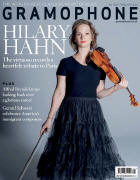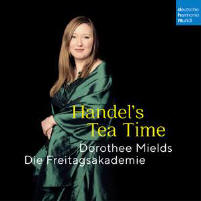Texte paru dans: / Appeared in: |
|
|
Outil de traduction (Très approximatif) |
|
|
Reviewer:
David Vickers It isn’t obvious what ‘Handel’s Tea Time’ means, nor if it is a northerner’s main meal or a southerner’s four o’clock cup of Earl Grey and slice of lemon drizzle cake, though one imagines the epicurean Handel would have cheerfully consumed all of them together. The booklet note sheds no light and contains poor inaccuracies, but the musical menu served up by Die Freitagsakademie is an ingenious mixture of predominantly arcane (and often spurious) Handelian vocal pieces in three languages interspersed with a vivacious chamber concerto in D minor (possibly by Telemann), some bits (but not all) of the so-called Harmonious Blacksmith keyboard variations, and a lively trio sonata of dubious authenticity – all played with expert delineation of textural details and moods. Dorothee Mields makes a charming case for several English songs of uncertain authorship. The little cantata Venus and Adonis presents a gorgeous dialogue between the stylish soprano and oboist Katharina Suske conveying melancholic grief. The miniatures ‘Bacchus one day gayly striding’ and ‘The Rapture’ (‘When I survey Clarinda’s charms’) are surely misattributions, but I cannot remember encountering recordings of either before: ‘Bacchus’ is treated by Mields and violinist Ilia Korol with incremental comedic inebriation; ‘When I survey Clarinda’s charms’ (possibly by Geminiani) is instantly forgettable. We are on solid terra firma with Mi palpita il cor, a cantata first composed during Handel’s early years in Britain. Given here in its original form for soprano voice with oboe obbligato, the first few phrases juxtaposing a heartbroken lover’s throbbing palpitations and virtuoso agitated soul are executed dazzlingly; the siciliano ‘Ho tanti affanni in petto’ partners the aching sorrow of Mields’s voice part with Suske’s soulful oboe. The singer’s expertise in Bach and Telemann (and much else) pays handsome dividends in three of the German arias Handel composed in London during the mid-1720s: ‘Flammende Rose, Zierde der Erden’ and ‘Süsser Blumen Ambraflocken’ are embellished impeccably, the treble obbligato part shaped mellifluously by violinist Korol, and tasteful continuo support given by cellist Balázs Máté, theorbist Jonathan Rubin and harpsichordist Sebastian Wienand. The Plaint from Purcell’s The Fairy Queen is a baffling encore but has transfixing allure. |
|




